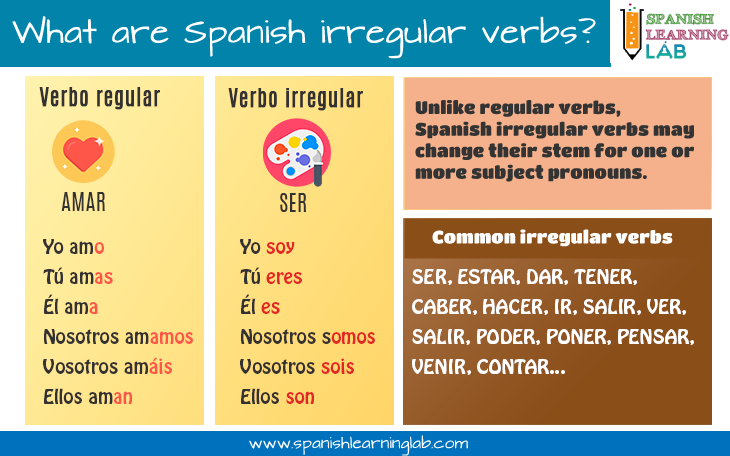Hello and welcome to a new lesson. Previously, we learned about regular verbs in Spanish in the present indicative. This time, we will introduce a list of common irregular verbs in Spanish through beautiful pictures and explain how to conjugate them in the present tense too. We have included many sample sentences, simple explanations and interactive quizzes that will surely allow you to learn a thing or two about this topic. Let’s start…
Video Introduction: The basics about irregular verbs in Spanish
Spanish irregular verbs are really common in the language, so to use them we must memorize their conjugations. Some of them will change their form for a few pronouns and stay the same for others, but most of the time they will have an unpredictable behavior. Here is a video explaining more about irregular verbs in Spanish and giving some specific examples.
What are Spanish irregular verbs? – Los verbos irregulares
Spanish irregular verbs, los verbos irregulares, are a special type of verbs that do not follow conjugation rules like regular verbs do. For a typical regular verb like “ESTUDIAR”, we know that the conjugations or forms for each pronoun are predictable based on the rules for “-AR” ending verbs, so we could say “Yo estudio“, “Tú estudias“, “Él estudia” and so on. On the contrary, an irregular verb ending in -AR like CONTAR won’t follow the same pattern a regular verb like ESTUDIAR for one or more pronouns, which makes it an irregular verb.
The irregular verb SER, for instance, will be conjugated as SOY for the subject pronoun YO, very different to the form “SO” which would be the conjugation if it were regular.
- Correct: Yo soy tu amigo. (I am your friend.)
- Incorrect: Yo so tu amigo.

Common irregular verbs in Spanish in the present tense
There are lots of irregular verbs in Spanish besides SER, ESTAR and the others listed in the image above. Later, we will see some examples of sentences using Spanish irregular verbs for you to see that they are important in everyday conversations, and that there is no way to master the language without spending time on them. Check this short list of common Spanish irregular verbs. Click on play to listen to the conjugations.
|
Tener – Yo tengo, tú tienes, él tiene, nosotros tenemos, vosotros tenéis, ellos tienen
To have – I have, you have, he has, we have, you have, they have
|
|
Dar – Yo doy, tú das, él/ella da, nosotros damos, vosotros dais, ellos/ustedes dan
To give – I give, you give, he/she gives, we give, you give, they/you give
|
|
Hacer – Yo hago, tú haces, él hace, nosotros hacemos, vosotros hacéis, ellos hacen
To do – I do, you do, he does, we do, you do, they do
|
|
Caer – Yo caigo, tú caes, él cae, nosotros caemos, vosotros caéis, ellos caen
To fall – I fall, you fall, he falls, we fall, you fall, they fall
|
|
Salir – Yo salgo, tú sales, ella sale, nosotros salimos, vosotros salís, ellos salen
To go out – I go out, you go out, she goes out, we go out, you go out, they go out
|
|
Saber – Yo sé, tú sabes, él sabe, nosotros sabemos, vosotros sabéis, ellos/ustedes salen
To know – I know, you know, he knows, we know, you know, they know
|
|
Ver – Yo veo, tú ves, él ve, nosotros vemos, ustedes, ellos ven
To see – I see, you see, he sees, we see, you see, they see
|
As you can see in the previous chart above, Spanish irregular verbs do change radically. For instance, the verb “Saber” (to know), would be normally conjugated as “Yo sabo” if it were regular, but since it is an irregular verb, we must memorize its forms first and then say “Yo sé” instead. Take a look at these sentences:
- Correct: María tiene una casa muy linda. (Maria has a very beautiful house.)
- Incorrect: María tene una casa muy linda. (if we followed the rules for regular verbs)
- Correct: Los niños van a la escuela todos los días. (The kids go to school every day.)
- Incorrect: Los niños ir a la escuela todos los días. (Not possible to find a suitable conjugation as a regular verb)
A list of common irregular verbs in Spanish
Next, we show you a list of twenty other important irregular in their infinitive form through pictures. Remember that some of these verbs will change partially and others radically once you conjugate them in any tense, so tools like this conjugation website for verbs always come handy. We will see some of them in use through sentences later. For now, try to get the meaning of each verb from the drawings.

Here are some examples of sentences using some of these Spanish irregular verbs:
| Sentences with Spanish irregular verbs |
|---|
|
HACER – Ellos hacen sus tareas solos.
They do their homework by themselves
|
|
SABER – Yo sé que tú tienes la razón.
I know you’ve got the reason
|
| CABER – Creo que yo no quepo en el auto. Hay demasiada gente. I think I don’t fit in the car. There is too many people. |
| DECIR – Ella dice que es mala idea salir a esta hora. She says that it’s a bad idea to go out right now. |
| OIR – ¿Qué es eso? – Yo no oigo nada. What’s that? – I don’t hear anything. |
Interactive quiz:
Key Spanish irregular verbs in Spanish
The verb ESTAR (to be) in the present tense
ESTAR is a pretty common irregular verb, and it is actually one of the first ones you should add to your list of Spanish irregular verbs. ESTAR is one of the forms of “the verb to be” and it is particularly useful to talk about states, feelings and emotions, actions in progress and to indicate the location of objects. If ESTAR were regular, then for the pronoun YO, we would say [EST + O], but it is irregular, so it will actually be conjugated as ESTOY as in “Yo estoy“.
The chart below shows the conjugations for the Spanish irregular verb ESTAR as well as some sentences in the present tense in Spanish with this verb. Pay attention to the correct pronunciation of the verb. Please check the related lesson to learn more about this verb.
| Sentences with the conjugations of ESTAR |
|---|
|
Yo estoy enojado
I am angry
|
|
Tú estás/Vos estás ocupada todo el tiempo
You are busy all the time
|
|
Él/Usted/ Ella – Ella está haciendo su tarea
He/you/She is doing her homework
|
|
Nosotros estamos felices de estar aquí
We are happy to be here.
|
|
¿Vosotros estáis enfermos?
Are you sick?
|
|
Ellos, Ustedes – ¿Ustedes están tomando clases de español?
Are you taking Spanish classes?
|
Conjugating SER (to be) in the present tense
SER is the second form of the verb to be, and it is also one of the most common Spanish irregular verbs. Unlike ESTAR, SER is used to describe things like rooms and parts of the house, to describe people, to talk about time, nationalities and many other things. SER will change completely for some pronouns. The chart below shows how to conjugate the irregular verb SER and make present tense sentences in Spanish for all pronouns.
| Sentences with the conjugations of SER |
|---|
|
Yo soy tu hermano
I am your brother
|
|
Tú eres muy inteligente
You are very smart
|
|
Vos sos mi mejor amigo
You are my best friend
|
|
Él, Ella, Usted – Usted es mi maestro favorito.
You are mi favorite teacher
|
|
Nosotros somos de Japón
We are from Japan
|
|
Vosotros sois tan talentosos.
You are so talented
|
|
Ustedes/Ellos – ¿Ellos son tus amigos?
Are they your friends?
|
Conjugating IR (to go) in the present tense
IR (to go) is another common verb you should really know how to use. It can be used in simple sentences in the present tense in Spanish or as an auxiliary for the future tense, especially for making future plans just like the structure “going to” in English. As you may suspect, the verb IR like other Spanish irregular verbs, will change totally when conjugated for all the pronouns. The chart below shows how to conjugate IR.
| Sentences with the conjugations of IR (to go) |
|---|
|
(Yo) voy a la casa de mis padres casa fin de semana
I go to my parent’s house every weekend
|
|
Tú vas al cine cada jueves
You go to the movies every Thursday
|
|
Ella, Él, Usted – Él va a terminar eso mañana. He is going to finish that tomorrow
|
|
Nosotros vamos a la playa en verano
We go to the beach in summer
|
|
¿Vosotros váis ahí a menudo?
Do you go there often?
|
|
Ellos/Ustedes – Ellos van a jugar hoy.
They are going to play today
|
Related Spanish Worksheets:
- List of Common Irregular Verbs
- Conjugating Irregular Verbs
- Irregular Verbs in Spanish in the Present Tense
- Spanish Verbs Conjugation (Present Tense)
- The Verb IR
- The verb SER
- The verb ESTAR
- The Verb TENER
- The Verb HACER in Spanish
- Spanish Stem-Changing Verbs O to UE

this is an awesome site!
It helps me with my spanish really well
It’s good to hear that 😉